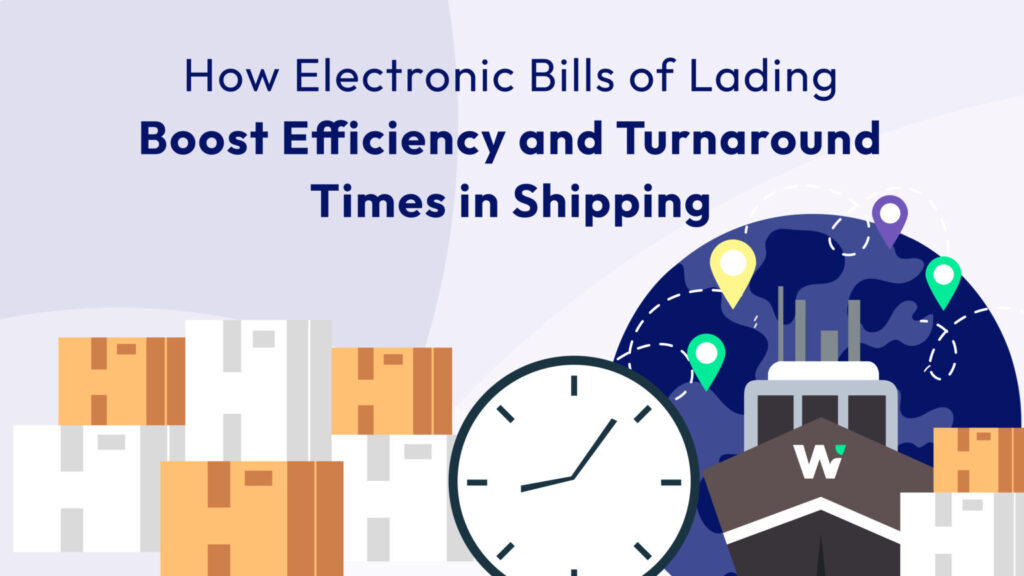Let’s face it: Every delay, hiccup, or bottleneck can reverberate through the supply chain, impacting costs, customer satisfaction, and overall business performance.
What’s one of the most minor components with the most significant impact on the industry? Bills of Lading.
Paper bills of lading, while traditional, are cumbersome. They require physical handling, are prone to loss or damage, and can lead to delays in processing and delivery.
That’s why Electronic Bills of Lading (eBLs) are so crucial to the future of global trade. In this blog post, you’ll learn how eBLs have emerged as a transformative solution for streamlining trade operations, offering faster turnaround times and enhanced efficiency.
The Urgency of Digital Transformation in Shipping
It’s no secret that paper-based trade document processes are inefficient, causing delays that hinder shipping operations. Delays can have significant financial consequences because the shipping industry operates in a highly competitive and fast-paced environment.
These inefficiencies in document processing can result in missed deadlines, increased costs, and decreased customer satisfaction, ultimately impacting the bottom line.
So, it’s evident that digital solutions are the future of all industries, including shipping. The shift towards digitalization isn’t just a matter of convenience—it’s a strategic move for survival and growth. But why now?
The DCSA Commitment to Digitalization by 2030
The Digital Container Shipping Association (DCSA) has taken a decisive step toward the future of shipping by spearheading the movement toward complete digitalization. Their efforts have garnered support from 10 of the industry’s top ocean carriers, underscoring the significance of their commitment to achieve complete digitalization by 2030.
The Impact on Freight Forwarders and Stakeholders
The DCSA’s commitment represents an industry-changing moment for freight forwarders and other stakeholders. Embracing this digital revolution is imperative for survival and success. Those who hesitate risk falling behind, encountering operational inefficiencies, and relinquishing their competitive advantage in an ever-evolving market.
However, the potential benefits for those willing to embrace digitalization are endless. By embracing digital solutions, businesses can scale their operations, enhance efficiency, and fortify their position in a rapidly digitizing industry.
Transforming Trade Operations with eBLs: Small Change, Big Impact
Transitioning to Electronic Bills of Lading (eBLs) is a tiny step that marks a significant shift in trade operations, offering a streamlined alternative to traditional paper-based processes. Here’s how eBLs make a big impact with small changes:
- Faster Processing: eBLs expedite document processing and transmission, reducing the time needed for approvals, signatures, and handoffs between parties.
- Real-Time Tracking: With eBLs, stakeholders gain the ability to monitor shipment status and location in real-time, enhancing visibility and enabling proactive logistics management.
- Reduced Errors: Digital documentation minimizes errors stemming from manual data entry, ensuring precision and compliance throughout the trade process.
- Improved Collaboration: eBL platforms foster seamless collaboration among stakeholders, facilitating swifter communication, document sharing, and decision-making.
- Cost Savings: By dispensing with paper-based documentation, eBLs drive savings by curbing printing, storage, and administrative expenses.
eBL Success Stories: Unlocking Cost Savings and Efficiency Gains
Our customers have already streamlined their trade operations and achieved remarkable efficiency gains by embracing electronic bills of lading. Explore our case studies to delve deeper into how eBLs have transformed their turnaround times HERE.
- RS Logistics: “Working on a singular platform has increased our efficiency and workflow effectiveness by 70%.”
- KPM: “Using WaveBL saved 2.5 hours of work per BL. Now, eBLs arrive 5 days before cargo, a significant improvement from the previous 3-day lag time.”
- Pegasus: “We no longer need to deal with delivery delays due to weather, traffic ., geopolitical challenges, COVID, and other concerns.”
Join the Digital Revolution: Work Smarter with WaveBL
Electronic bills of lading are a small component of the shipping industry. However, the challenges posed by paper-based trade documents are substantial and far-reaching.
By embracing eBLs, you can take one simple yet powerful step towards optimizing your trade operations and driving significant improvements in efficiency and competitiveness.
This is why the top nine out of ten carriers have committed to going fully digital by 2030—that’s not so far away.
Don’t wait until it’s too late. Take that crucial step today with WaveBL. Stay ahead of the curve and move towards streamlined, future-ready trade documentation management. Schedule a demo now and witness the difference firsthand!
Stay tuned for more insights, success stories, and updates as we navigate the future of trade together.
WaveBL – Transforming Trade, Empowering Businesses. Your Gateway to Efficient Trade



